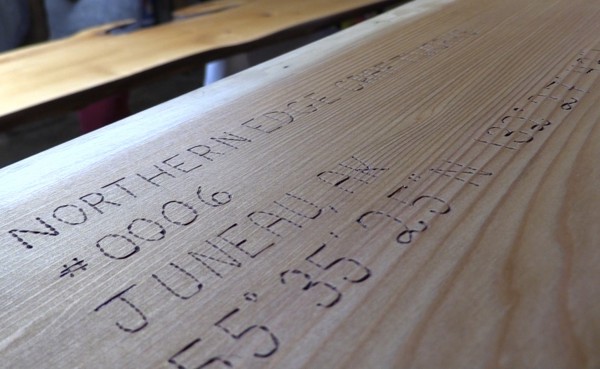The U.S. Forest Service recently released a plan giving loggers a timeline for the transition to second-growth harvesting. The plan is currently open for public comment. A proposal to end clearcutting of old-growth trees in the Tongass National Forest has some Southeast logging companies concerned about the future.
Susan Tyler runs Icy Straits Lumber & Milling in Hoonah with her husband Wes. It’s a family business and one of the few surviving timber companies in the region.
Wes has been harvesting trees in Alaska since 1967. For the past 34 years, he’s packed his truck with power saws, axes and wedges to drive along winding roads on Chichagof Island. Once in the woods, he searches for a tree the U.S. Forest Service has marked with paint, indicating it can be removed from the old-growth forest and processed into lumber.
“Typically we are harvesting in the summertime, although we have been out in knee-deep snow harvesting too,” Wes said. “We put in a good eight-hour day out there normally, you know, working in the woods.”
Following selective logging regulations managed by the Forest Service, the company has downsized from 200 employees in the 1980s to only 10 today. New proposed restrictions that would eliminate harvest of old-growth trees are troubling for the Tylers. In a phone call from Hoonah, Wes said the company is bracing for big changes.
“The timber industry today is barely existing,” Wes said. “So you know what’s available to us here is what we’re trying to create jobs with and keep our local people working to the best of our ability.”
Wes could talk about trees for hours.
He said that the company harvests four different tree species on the island: Sitka spruce, western hemlock, alder and yellow cedar.
“Yellow cedar is a lot smaller tree than either hemlock or spruce typically,” Wes said. “It just doesn’t grow that fast. And it doesn’t grow real straight so you have sweeps and curves and kinks and there’s a lot of defect in it, so it takes a lot of work to extract all the goodies that are in it. Which we do. We take everything in that yellow cedar tree right down to a very small size.”
Lately, Susan has been spending much of her time in Juneau — a 20-minute flight east of Hoonah. She has a showroom in the capital city that is typically closed. But with the flip of a switch the room becomes aglow with woodwork. The space resembles an upscale flea market featuring only wood. Pieces range from dollhouse-sized model cabins to full kitchen counters.
She manages the showroom herself because it would be too costly to employ someone else. Susan said Icy Straits Lumber & Milling is up against big corporations like Home Depot for business. Timber sales available in the Hoonah area only allow selective logging, making profits that much harder to come by.
Bidders on timber sales are told how much wood can be harvested from each plot, but they don’t know how much of the wood is actually valuable, Susan said.
“Right now we have a lot of very expensive equipment and it’s hard to go after another timber sale because you don’t know what’s in that timber sale,” Susan said.
The new proposed restrictions could reduce the supply of trees available for harvest.
“There is a lot up in the air because … they want to stop all old-growth harvesting. Of course, that would eliminate us from harvesting any,” she said.
According to the Forest Service, the supply of second-growth forest, regrown from past clear cuts, is large enough to allow a smooth transition into the new policy.
Icy Straits Lumber & Milling is considering a switch to harvesting regrown trees, but Susan worries the Hoonah area may not have enough second-growth forest to sustain her company in the future.
“We don’t know, and you don’t want to keep investing in equipment if you don’t know what the future holds,” she said.
To supplement what standing trees they can harvest, Susan says her company also collects trees that wash up on the beach, dead standing wood, danger trees, blow downs and trees that have a dead top but are mostly usable. All of this is also managed by the Forest Service.
Some of that wood ends up in the hands of Juneau woodworker Reid Harris.The young entrepreneur started a wood furnishing business called Northern Edge Craftworks. His tables are made from vertical woodcuts that keep the natural, rough edge of the tree.
Most of the logging company’s business comes from locals like Harris. His basement and garage workshops are lined with tree slabs ranging from the length of a baseball bat to that of a kayak.
Harris exemplifies optimism for an industry with an unknown future.
He wants to connect the people who purchase his pieces to the life of the tree, so he marks each table he makes with the coordinates of where the tree was taken.





